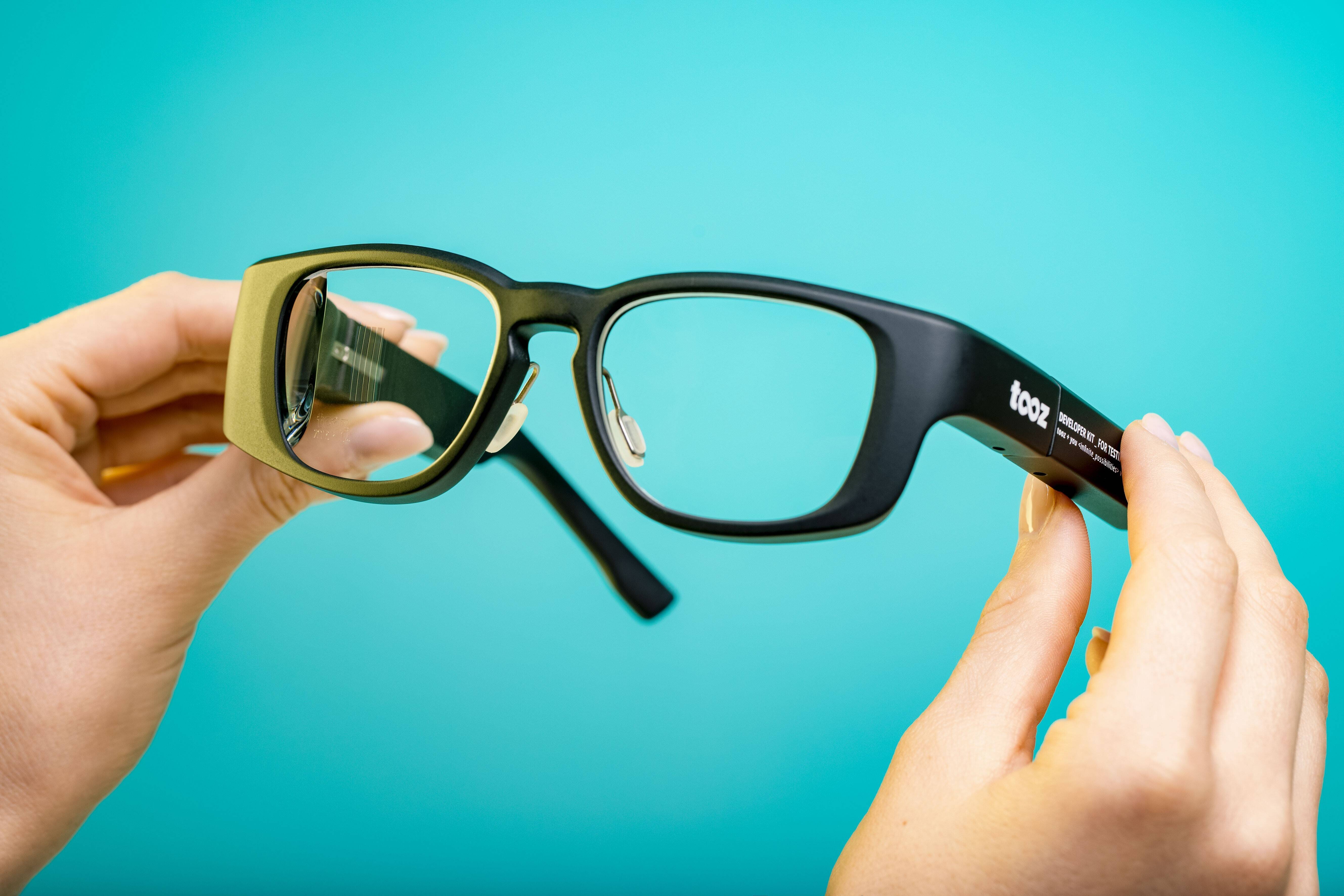How Smart Glasses Could Revolutionize the Way We Work
Reading time for this article: 5 minutes
At BSH, we want to proactively create business opportunities instead of just reacting to challenges. That's why we constantly challenge ourselves to think outside the box and look for new innovative ways to improve the quality of life at home. Smart glasses – artificial intelligence meets a hands-free wearable device, are not only enjoying increasing popularity, but could also fundamentally change the way we interact with home appliances and conduct business.
BSH is already using smart glasses as a maintenance tool in its Dillingen plant but that’s just the tip of the iceberg. Powered by the BSH Startup Kitchen, the BSH Design Community and BSH Werkstatt have teamed up with tooz technologies, a startup developing optical systems for smart glasses, to explore the impact of this wearable on BSH-relevant consumer journeys, processes and systems across the company, always with the consumer in mind.
But First Things First – Why Are Smart Glasses Even a Thing?
Smart glasses display information hands-free in the user’s field of view in a minimalist format, making them ideal for applications including navigation, calls, and notifications such as calendar reminders, and messaging platforms. In work environments, the smart wearables allow users to receive step-by-step visual instructions on how to complete tasks while keeping their hands free for assembly, repair or maintenance work. Almost like an extension of visual perception, but with far more cognitive power to enhance human capabilities.
"I think smart glasses and the particularly immersive concept behind them (mixing digital and analog visual content) are the logical step after smartphones, watches and other wearables” adds Sebastian Schwartze, Head of Design for Regional & Tactical Brands at BSH.
Sebastian Schwartze also expects that with the right platform and an affordable technical solution, smart glasses will scale for public use within the next five years and become an important interface for “meta-everything”.
For this reason, we wanted to take a closer look at this promising new technology and investigate its impact on the way we work at BSH. Powered by BSH Startup Kitchen, the BSH Design Community and BSH Werkstatt have teamed up with tooz technologies, a joint venture of German companies ZEISS and Deutsche Telekom. With its mission to upgrade normal prescription glasses with digital virtual lenses, tooz develops optical engines that enable cost-effective and unobtrusive smart glass solutions.
 tooz DevKit Smart Glasses
tooz DevKit Smart GlassesWith the help of Meike Kastner (BSH Startup Kitchen), Berkay Ogulcan Tutal (BSH Werkstatt), and many other teams of innovative entrepreneurs, we were able to organize a hackathon to discuss possible use cases for the smart AR wearables within BSH. The hackathon was held completely virtually, bringing together 16 ingenious BSH teams from all over the world.
And the result? A lot of great ideas, of which three proposals stood out in particular:
-
“Field Technician” (Winner):
The “Field Technician” represents an approach to an immersive solution for BSH technicians in the field. Before, during and after the assignment, smart glasses provide support with navigation, diagnostics, information and additional services, keeping the technician's hands free. -
“Holistic Journey” (1st runner up):
This use case is based on using smart glasses to create a holistic journey with advanced notifications to become the best version of yourself. Take dinner, for example: Smart glasses could display the shopping list while in the supermarket, guiding the user step-by-step to an enjoyable dinner with loved ones. This way, smart devices provide valuable information and create a real flow. -
“Sustainable Manufacturing" (2nd runner up):
This concept pursues a sustainable approach by giving factory workers hands-free guidance during disassembly and aims to standardize a process that allows BSH to recycle and reuse components and materials.
“When a service technician has to make a home visit, the expectation that the problem will be fixed the first time is higher than ever. A second visit is out of question from a cost-customer-satisfaction, and pandemic standpoint. With this in mind, the field technician is a great use case for smart glasses," adds Baris Taptik, IT Innovation Expert at BSH.
But see for yourself:
What’s next?
Currently, there are two main perspectives to consider: One is the platform/software perspective and the other is aimed at the technology itself. As for the first, the most interesting question will be where the content will come from. With groundbreaking new virtual reality spaces like the Metaverse, which allows users to interact with/in a computer-generated environment, we can expect a new kind of interaction to shape our lives, as did the early years of the Internet.
Secondly, the technology part will determine how smart glasses are used in daily life and is therefore crucial for its future success. In this context, our Head of Design Regional & Tactical Brands Sebastian Schwartze believes that smart glasses could be the new constant companions (much like the increasingly advanced and customized smartphones) – depending on their practical functionality to enable specific use cases.
The BSH Startup Kitchen team which is at the forefront of technological advancement around the world, advised to be both – patient and persistent in order to harness the real impact of smart glasses in business operations. They expect that this technology will change the way we interact in certain situations, such as in factories for training purposes, at home for technician visits, and even in showrooms where an added virtual environment will help consumers experience the "WOW" factor. In the long run, solutions like the tooz smart glasses will shape how eyewear will look and function, consequently changing how we interact day by day with our surroundings.
“Few years from now, the masterclass from Gordon Ramsay or Marie Kondo will happen on your smart glasses. Smart glasses will become the Peloton for knowledge sharing." Dipjyoti Deb from BSH Startup Kitchen




